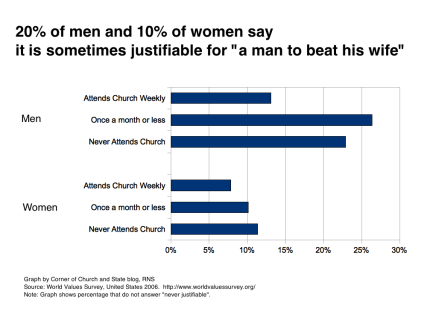The holiday season is generally regarded as a time of greater violence against women by their partners. Much of this violence is due to the alcohol abuse and sporting events that coincide during the holidays. But also important is public stigma–is it acceptable for a husband to attack his wife? For one-in-five men, the answer is that it’s sometimes ok.
The World Values Survey is a scientific study of the values and beliefs in over 50 countries. In the latest round, the survey asked a series of questions on ethics. This series included a question asking whether “a man beating his wife” was always justifiable, never justifiable, or something in between. In the U.S., a fifth of men refused to say that wife beating was never justifiable. Among women, one-in-ten said it was sometimes ok.

Among American men, a sizable minority believes that this violence is sometimes justifiable. Religion shapes our views of domestic violence. Those who rarely darken a church door are twice as likely to see violence against wives as reasonable (at least some of the time).
Among women, religious activity has less of an effect, but women are still less likely to see violence as justifiable if they regularly attend religious services.
The likely reason for these religious differences is due to religious people having more conservative views on sexuality and social issues. Pilar Rodríguez Martínez and Huzefa Khalil found that people with more liberal views on sexuality-related issues tend to be more tolerant of husbands beating their wives. This conclusion comes with an important caveat: this pattern can be reduced when people support the equality of women. In other words, the man who is liberal on sexuality issues but who opposes equality is the man most likely to see violence against wives as justifiable. Those who hold to conservative social views and/or support women’s equality are strongly opposed to this abuse.
Rodríguez Martínez and Khalil find this pattern most striking in developing countries. In advanced democracies, like the United States, many people, regardless of their social values, oppose domestic violence. The one exception are those who hold to inegalitarian views of women. Spousal abuse is justified the most by those who believe women should have a lower, unequal role in society and hold to more liberal views of sexuality.
But while religious people with conservative social views are likely to oppose violence, their view of the family also affects women. Sociologist Nancy Nason-Clark studied how clergy respond to abuse. She interviewed hundreds of conservative Protestant clergy, who are often a first contact by women in abusive relationships. Nason-Clark found that pastors do not justify the continuation of abuse, but the value they place on the family does lead them to encourage women to stay with their partners. This is particularly true when the husband shows signs that he is willing to change his behavior.
—
Here are few more disturbing facts I uncovered about intimate partner violence:
— A study in northwest England found that a win or tie by the national team in the FIFA World Cup increases the risk of violence by 26 percent. When the team loses the risk, increases by 38 percent.
— In Glasgow, days of soccer matches between the two cross-town rivals increases domestic violence, regardless of the outcome.
— Violence can also be based on controlling a woman’s resources. The chances of violence increases after a woman receives a monthly TANF payment (food stamps). Breaking TANF into two smaller payments spread out over the month can reduce this risk.





